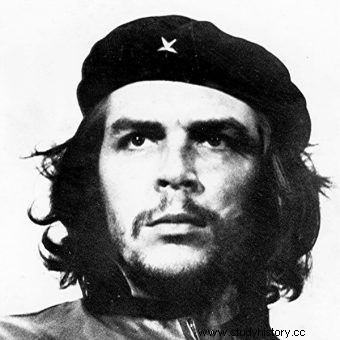
Che Guevara (photo:public domain)
Che Guevara (1928-1967) - Latin American revolutionist. Ernesto Guevara de la Serna was born in Argentina to a left-wing middle-class family. As a child, he was ill and thus avoided conscription to the army. He graduated from medicine. After graduation, he set off on a motorcycle expedition around South America (the "Motorcycle Diary" was created then).
During this time, his views became radicalized and he began to identify with the revolutionary left. He settled in Guatemala, where he practiced medicine, became involved with the Peruvian Hilda Acosta, established a network of contacts, incl. with the Cuban revolutionaries. After the CIA coup in Guatemala, Che was forced to flee. He settled in Mexico and married Hilda. In 1955, he joined the July 26 movement to overthrow the Cuban dictator Fulgencio Batista. It was during this time that he met the Castro brothers - Fidel and Raul. In 1956, revolutionaries went to Cuba, but were crushed. Only 12 of the landing troops survived, including Che and the Castro brothers. They took refuge among the poorest Cubans and started building an army almost from scratch.
Guevara, as a leader of partisan units, was responsible, among other things, for educating the local population. On January 1, 1959, in the face of the successive successes of the revolutionaries with whom his generals negotiated peace, Batista fled the country. Che became involved in creating a new system in Cuba. As a member of the government, he took part in reforms; traveled the world. In 1964, he went to the United Nations headquarters as head of the Cuban delegation. At that time, he criticized the policy of apartheid, worse treatment of the black people in America and the Indians. At that time, there were two unsuccessful attacks on him. In 1965, he retired from public life, resigning from political functions and went to Africa to fight the Congo conflict. His goal was to "export the revolution." In 1966, Guevara moved to Bolivia, where he joined the local guerrilla fighting against the military junta. In 1967 he was taken prisoner and executed.
